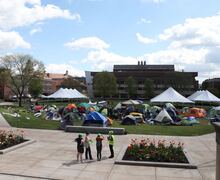SU’s Asian/Asian American studies program needs more resources, professors say
Wendy Wang | Staff Photographer
Roughly 3,800 incidents of racial violence against Asian Americans have been reported during the pandemic, according to Stop AAPI Hate.
Get the latest Syracuse news delivered right to your inbox.
Subscribe to our newsletter here.
Syracuse University professors believe that a strong Asian/Asian American studies program could be critical to combating anti-Asian racism. But the university’s program needs more resources and support to best educate students.
Mary Szto, a teaching professor in SU’s College of Law, said in a public forum earlier this month that the Asian/Asian American studies program lacked resources and funding. The forum addressed the recent rise of anti-Asian hate in the U.S. and how the university should respond.
“One very concrete thing we can do is fund, give more resources to our Asian and Asian American studies program,” Szto said at the forum. “We’re under-resourced. We’re underfunded. That’s something we can start here at the university.”
Anti-Asian hate has increased dramatically during the pandemic. Roughly 3,800 incidents of racial violence against Asian Americans have been reported during the pandemic, according to Stop AAPI Hate, a nonprofit that tracks hate incidents against Asian Americans and Pacific Islanders in the U.S.
Faculty teaching courses in the Asian/Asian American studies program said that education is critical to countering anti-Asian hate. But underfunding and understaffing within SU’s program undermines these efforts, they said.
Gerald Greenberg, associate dean for the College of Arts and Sciences, said in a statement that the program receives funding comparable to other similar programs within the college but would not provide specific figures.
“It is an important program for the college and the university,” Greenberg said.
In addition to concerns about funding, some faculty members described a lack of faculty concentrated in one area of study as an issue within the program.
Asian/Asian American studies involve unique points of view and levels of academic experience, but many faculty members associated with the minor are not dedicated solely to Asian or Asian American studies, said Gareth Fisher, an associate professor of religion and a program faculty member.
Fisher works within the Asian/Asian American studies program, but he also directs the Chinese studies program and teaches in the religion department. He wants the Asian/American studies program to focus on gathering faculty devoted to Asian American studies.
“Faculty who have expertise in Asian studies, such as myself, do not have qualifications necessarily to teach Asian American studies,” Fisher said. “I would be very uncomfortable teaching an Asian Americans studies course since there are absolutely scholars that specialize in this field from a wide range of disciplines.”
Tej Bhatia, a professor of linguistics and a program faculty member, said the program needs fundamental improvements. He recommended hiring more faculty, offering more support to faculty and making classes about diversity more ingrained in students’ required coursework.
“It cannot be, ‘Okay, you give one additional course here and there,’” Bhatia said. “It has to be the integral part of international relations, or international education.”
But even if the program does hire more faculty, garnering interest from students may still be challenging, Fisher said.

Sarah Jimenez Miles | Design Editor
When rebuilding a program, it can take time to get students involved and interested in the content, he said. The university needs to ensure there is a wide enough variety of courses offered within the program.
“You have to have multiple avenues in which students can enter into a program,” he said. “Sooner or later, they’re going to build up because there are different ways in which students can enter into these courses and gain interest.”
The shutdown of study abroad opportunities during the pandemic has also negatively affected students’ interest in the Asian/Asian American studies program this year, Fisher said.
Study abroad opportunities in China, which aren’t connected to the Asian/Asian American studies program, were open to students of all majors and minors. But the opportunities they provided are especially beneficial for students in the program, Fisher said.
The programs, which paused due to the pandemic, are hopefully going to restart soon, said Yingyi Ma, an associate professor of sociology and director of the program, in an email.
While the administration’s acknowledgement of anti-Asian hate across the country shows their solidarity with the Asian American community, this acknowledgement is only the first step, Fisher and Bhatia said.
“The problem is not anything like indifference toward racism on the part of the administration,” Fisher said.
The problem is a lack of communication between those who create curriculum and those who do the hiring, he said. The hiring process is in the hands of individual departments with their own budget restraints, Fisher said.
The rise in anti-Asian hate incidents in the U.S. only increases the need for Asian and Asian-American academic communities, Bhatia said.
Student-led organizations at SU have rallied around combating anti-Asian hate incidents in recent weeks.
A white man shot and killed eight people — Hyun Jung Grant, Xiaojie Tan, Daoyou Feng, Paul Andre Michels, Yong Ae Yue, Suncha Kim, Delaina Ashley Yaun and Soon Chung Park — in three spas in Atlanta on March 16. Six of the victims were women of Asian descent.
The SU campus community has not been immune to this wave of anti-Asian hate. Notes containing racist language targeting Chinese students were found in at least three SU buildings on March 11, and on Feb. 28, two people reportedly used anti-Asian language toward a student.
In August, SU placed a professor on administrative leave for using derogatory language toward people of Asian descent in his course syllabus. The professor referred to the coronavirus as “Wuhan Flu” and “Chinese Communist Party Virus.”
“It brought to surface the issues which Asians have been talking about,” Bhatia said. “They’ve been suffering in silence, Asian Americans. It takes an emotional toll, and you don’t have the outlets. We’re improving on that.”
Fisher said the university and the Asian/Asian-American studies program have roles to play in combating this widespread hate.
“Fundamentally, as an educational institution, our first response to any kind of hate and intolerance is to educate people and to hire professionals who have expertise in areas like Asian American studies, and to invest the money in having actual scholars here in those areas that can teach students,” he said.
Fisher and Bhatia agreed that the administration is taking steps in the right direction, but the problems Asian Americans currently face have been the same for generations, and these steps are only the beginning of the changes they hope to see.
“So the time is right. We can do it,” Bhatia said. “The awareness is here.”
Published on April 21, 2021 at 10:30 pm
Contact Richard: [email protected] | @richardperrins2





